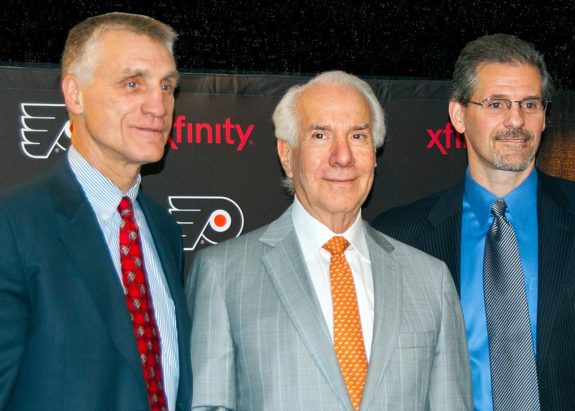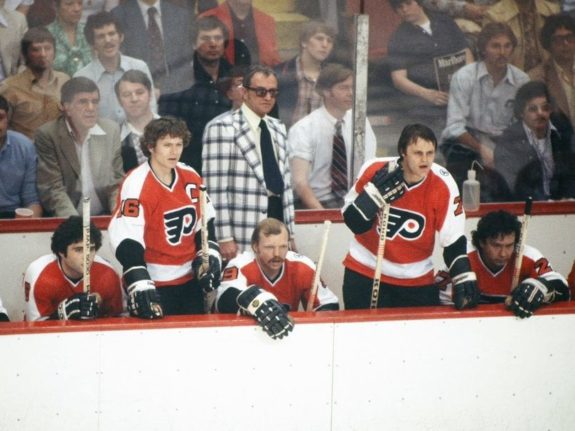The Philadelphia Flyers honored their organization’s founder and long-time chairman of Comcast-Spectacor Ed Snider on Wednesday at their first home game since the sixth anniversary of his death on April 11.
Snider lost his battle with cancer in 2016 at his home in California at the age of 83. The influential entrepreneur and philanthropist is survived by his wife Lin, six children, and 15 grandchildren.
Founding the Flyers
Snider put his heart and soul into the Flyers from the very beginning. When he expressed initial interest in making Philadelphia one of the destinations for the NHL expansion wave of 1967, many perceived his idea as an outrageous proposition that could never materialize. Banks in Philadelphia showed no interest in investing in ice hockey, a sport completely unfamiliar to the City of Brotherly Love.
Snider mortgaged his home to help the financial complications, and Girard Trust Bank in Philadelphia eventually helped the cause thanks to a former Harvard hockey player making the investment decisions. Public address announcer Lou Nolan appropriately summarized the incredible perseverance in a pregame ceremony following Snider’s death in 2016, proclaiming, “With his determination and vision, the Philadelphia Flyers became a reality.”

The early years of expansion weren’t kind to the Flyers, especially when Noel Picard of the St. Louis Blues viciously knocked out Philadelphia forward Claude LaForge during the 1968 Playoffs. Although the incident didn’t turn the team into a serious contender overnight, it became the unofficial birth of the Broad Street Bullies.
“We realized that we would have to become tougher, stronger, and bigger. And we may not be able to win a lot of games as we’re growing, but we certainly didn’t have to get beat up. So we decided that no team would ever intimidate us ever again, and we conducted our drafts and we conducted our philosophy in that direction.”
-Ed Snider
Their success legitimized the identity of an organization that revolutionized the NHL by using intimidation as a weapon to feed their talent. Star players Bobby Clarke and Bernie Parent joined forced with bruisers Dave “The Hammer” Schultz and Andre “Moose” Dupont to form the perfect blend of skill and intensity. Back-to-back Stanley Cups in 1974 and 1975 announced a new era of the NHL when expansion franchises could finally compete with the Original Six. Snider’s vision had officially become a success.
An unfamiliar sport like ice hockey didn’t become part of the passionate Philadelphia sports tradition immediately. It was the idea of the Broad Street Bullies that truly endeared the Flyers to the community. A city populated heavily by the working class in sectionalized ethnic neighborhoods quickly took notice of the local tough guys wearing the orange and black at the newly built Philadelphia Spectrum. They were beloved in their own city but hated outside of it.
If anyone appreciated the fine line between talent and terror the team was skating on, it was Philadelphians,” said Liev Schreiber in HBO’s documentary “The Broad Street Bullies” in 2010.
The Flyers sustained relevance at the top of the NHL well into the 21st century. Snider continued to advance his reputation as one of the most engaged and dedicated owners in professional sports. His work turned the Flyers into one of the most iconic brands in the NHL.
“He made it his mission to ensure that the Flyers were more than just a hockey team. He made them and all of us a part of his family,” Nolan told the Wells Fargo Center crowd in 2016.
Snider Youth Hockey Foundation
Snider’s work as a philanthropist is one of the most important elements of his lasting impact on the city of Philadelphia. The Snider Youth Hockey Foundation, created in 2005, “provides underserved children from urban neighborhoods in Philadelphia and Camden, NJ, with the opportunity to learn to play the game of ice hockey and as a means to succeed in the game of life.” The foundation provides additional educational resources to the children, and they funded 61 high school and college scholarships this year alone.
Related: Flyers Lacking Accountability From Scott & Fletcher
The Snider Youth Hockey Foundation recently announced the opening of a new rink at the Scanlon Recreation Center, located in the Kensington section of Philadelphia, a neighborhood affected by crime and social issues to severe extents in recent years. The Flyers publicized the initiative on Feb. 26, the day of a 2-1 victory over the Washington Capitals at the Wells Fargo Center. The project was made possible by generous donations from Flyers Charities. It is one of their five rinks in the Philadelphia area.
“The Flyers belong to the entire city of Philadelphia, and this project will send a lasting, clear message that hockey and the Flyers are for everyone- honoring the legacy of Ed Snider.”
– Valerie Camillo, President of Business Operation for the Flyers
Snider told the Philadelphia Daily News in 2011 that he wanted the foundation’s rinks to be his lasting legacy. They properly demonstrate Snider’s place as a rock of the Philadelphia community beyond the NHL and the ruthless chase for a Stanley Cup.
Controversy and a Fading Relationship with Flyers Fans
The sustained relevance of a franchise that made the NHL playoffs in 16 of 17 seasons between 1994-95 and 2011-12 has faded in recent years, especially since Snider’s passing, and frustration within the fan base boiled over during a lifeless 6-2 loss to the Pittsburgh Penguins at the Wells Fargo Center on Jan. 6. The date would’ve marked Snider’s 89th birthday, but the organization gave no public acknowledgment to their long-celebrated chairman.
The backlash they received demonstrated just how far the Flyers have fallen. Former defenseman Chris Therrien publicly blasted the organization. Fans on social media ruthlessly criticized them in numbers that shouldn’t be ignored. 97.5 The Fanatic, the radio home of the Flyers, dished out heavy criticism during its sports talk programming. Snider’s daughter even expressed her personal disappointment on Twitter.

Charlie O’Connor of The Athletic interestingly called the outrage “a stand-in for frustration with the on-ice product, which has reached a fever pitch since the start of the 2020-21 season” (Hopelessness has infected Flyers World — and it ain’t pretty: O’Connor’s Observations, The Athletic, 1/10/22). The fall from the good graces of the Philadelphia sports community can ultimately be attributed to a lack of success. In fact, before Snider passed, there was a popular sentiment that the continual celebration of Snider’s work in the early days and the Broad Street Bullies was working to the detriment of an organization that couldn’t move into a new era.
It’s no secret that the glory days of Snider and the Bullies are long gone. However, a new image that emulates the work of Snider without replicating it isn’t out of reach. The bottom line is that outrage within a fan base isn’t nearly as prevalent when a team is winning. The organization must also work separately with the Snider family to patch up an apparently damaged relationship.
Wednesday night provided the acknowledgment that should’ve taken place in January. It was step one in correcting the perceived negligence of the man without whom the Flyers wouldn’t exist. However, the organization has a long way to go to repair the image of a once iconic brand begun by a successful businessman and entrepreneur like Snider. They will have a much easier time establishing that new image if they can put a successful team on the ice.